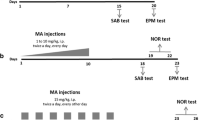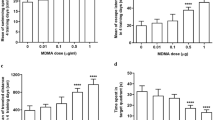Abstract
Rationale
Although chronic use of methamphetamine (METH) leads to long-lasting cognitive dysfunction in humans, there are few reports about an animal model that reflects METH-induced impairment of working memory.
Objectives
In this study, we investigated the effect of repeated METH treatment on spatial working memory in rats.
Materials and methods
Rats were repeatedly administered METH (2 mg/kg) once a day for 7 days, and their memory function was assessed with a delayed spatial win-shift task in a radial arm maze. The task consisted of two phases, a training phase and a test phase, separated by a delay.
Results
METH-treated animals showed an impairment of performance in the test phase when the delay time was increased from 5 to 30 min or longer. The effect of METH persisted for at least 14 days after the drug withdrawal. METH-induced impairment of working memory was reversed by clozapine (3 and 10 mg/kg, for 7 days), but not haloperidol (1 and 2 mg/kg, for 7 days). The improving effect of clozapine diminished 7 days after the withdrawal. Phosphorylated extracellular signal-regulated kinase1/2 (ERK1/2) levels were significantly increased in the hippocampus of saline-treated control rats from 5 to 60 min after the training phase. In contrast, hyperphosphorylation of ERK1/2 was abolished in the hippocampus of rats treated with METH.
Conclusions
These findings suggest that repeated METH treatment induces impairment of working memory, which is associated with a dysfunctional ERK1/2 pathway in the hippocampus. Furthermore, clozapine may be effective for the treatment of METH-induced cognitive dysfunction.







Similar content being viewed by others
References
Addy N, Levin ED (2002) Nicotine interactions with haloperidol, clozapine and risperidone and working memory function in rats. Neuropsychopharmacology 27:534–541
Addy NA, Pocivavsek A, Levin ED (2005) Reversal of clozapine effects on working memory in rats with fimbria–fornix lesions. Neuropsychopharmacology 30:1121–1127
Bisagno V, Ferguson D, Luine VN (2002) Short toxic methamphetamine schedule impairs object recognition task in male rats. Brain Res 940:95–101
Davidson C, Gow AJ, Lee TH, Ellinwood EH (2001) Methamphetamine neurotoxicity: necrotic and apoptotic mechanisms and relevance to human abuse and treatment. Brain Res Brain Res Rev 36:1–22
Friedman SD, Castaneda E, Hodge GK (1998) Long-term monoamine depletion, differential recovery, and subtle behavioral impairment following methamphetamine-induced neurotoxicity. Pharmacol Biochem Behav 61:35–44
Floresco SB, Seamans JK, Phillips AG (1997) Selective roles for hippocampal, prefrontal cortical, and ventral striatal circuits in radial-arm maze tasks with or without a delay. J Neurosci 17:1880–1890
Floresco SB, Braaksma DN, Phillips AG (1999) Thalamic–cortical–striatal circuitry subserves working memory during delayed responding on a radial arm maze. J Neurosci 19:11061–11071
Giros B, Jaber M, Jones SR, Wightman RM, Caron MG (1996) Hyperlocomotion and indifference to cocaine and amphetamine in mice lacking the dopamine transporter. Nature 379:606–612
Kalechstein AD, Newton TF, Green M (2003) Methamphetamine dependence is associated with neurocognitive impairment in the initial phases of abstinence. J Neuropsychiatry Clin Neurosci 15:215–220
Kamei H, Nagai T, Nakano H, Togan Y, Takayanagi M, Takahashi K, Kobayashi K, Yoshida S, Maeda K, Takuma K, Nabeshima T, Yamada K (2006) Repeated methamphetamine treatment impairs recognition memory through a failure of novelty-induced ERK1/2 activation in the prefrontal cortex of mice. Biol Psychiatry 59:75–84
Lee MA, Jayathilake K, Meltzer HY (1999) A comparison of the effect of clozapine with typical neuroleptics on cognitive function in neuroleptic-responsive schizophrenia. Schizophr Res 37:1–11
Marcus MM, Jardemark KE, Wadenberg ML, Langlois X, Hertel P, Svensson TH (2005) Combined alpha2 and D2/3 receptor blockade enhances cortical glutamatergic transmission and reverses cognitive impairment in the rat. Int J Neuropsychopharmacol 8:315–327
Meltzer HY, McGurk SR (1999) The effects of clozapine, risperidone, and olanzapine on cognitive function in schizophrenia. Schizophr Bull 25:233–255
Nagai T, Noda Y, Ishikawa K, Miyamoto Y, Yoshimura M, Ito M, Takayanagi M, Takuma K, Yamada K, Nabeshima T (2005) The role of tissue plasminogen activator in methamphetamine-related reward and sensitization. J Neurochem 92:660–667
Nagai T, Kamei H, Dohniwa M, Takayanagi M, Suzuki M, Matsuya T, Nabeshima T, Takuma K, Yamada K (2006) Involvement of hippocampal extracellular signal-regulated kinase 1/2 in spatial working memory in rats. Neuroreport 17:1453–1457
Nakajima A, Yamada K, Nagai T, Uchiyama T, Miyamoto Y, Mamiya T, He J, Nitta A, Mizuno M, Tran MH, Seto A, Yoshimura M, Kitaichi K, Hasegawa T, Saito K, Yamada Y, Seishima M, Sekikawa K, Kim HC, Nabeshima T (2004) Role of tumor necrosis factor-α in methamphetamine-induced drug dependence and neurotoxicity. J Neurosci 24:2212–2225
Nordahl TE, Salo R, Leamon M (2003) Neuropsychological effects of chronic methamphetamine use on neurotransmitters and cognition: a review. J Neuropsychiatry Clin Neurosci 15:317–325
Olton DS, Samuelson RJ (1976) Remembrance of places passed: spatial memory in rats. J Exp Psychol Anim Behav Processes 2:97–116
Qiao H, Noda Y, Kamei H, Nagai T, Furukawa H, Miura H, Kayukawa Y, Ohta T, Nabeshima T (2001) Clozapine, but not haloperidol, reverses social behavior deficit in mice during withdrawal from chronic phencyclidine treatment. Neuroreport 12:11–15
Schroder N, O’Dell SJ, Marshall JF (2003) Neurotoxic methamphetamine regimen severely impairs recognition memory in rats. Synapse 49:89–96
Seamans JK, Phillips AG (1994) Selective memory impairments produced by transient lidocaine-induced lesions of the nucleus accumbens in rats. Behav Neurosci 108:456–468
Seamans JK, Floresco SB, Phillips AG (1995) Functional differences between the prelimbic and anterior cingulate regions of the rat prefrontal cortex. Behav Neurosci 109:1063–1073
Seiden LS, Sabol KE, Ricaurte GA (1993) Amphetamine: effects on catecholamine systems and behavior. Annu Rev Pharmacol Toxicol 33:639–677
Simon SL, Domier C, Carnell J, Brethen P, Rawson R, Ling W (2000) Cognitive impairment in individuals currently using methamphetamine. Am J Addict 9:222–231
Simon SL, Dacey J, Glynn S, Rawson R, Ling W (2004) The effect of relapse on cognition in abstinent methamphetamine abusers. J Subst Abuse Treat 27:59–66
Srisurapanont M, Ali R, Marsden J, Sunga A, Wada K, Monteiro M (2003) Psychotic symptoms in methamphetamine psychotic in-patients. Int J Neuropsychopharmacol 6:347–352
Suzuki S, Augerinos G, Black AH (1980) Stimulus control of spatial behavior on the eight-arm maze in rats. Learn Motiv 11:1–18
Volkow ND, Chang L, Wang GJ, Fowler JS, Leonido-Yee M, Franceschi D, Sedler MJ, Gatley SJ, Hitzemann R, Ding YS, Logan J, Wong C, Miller EN (2001) Association of dopamine transporter reduction with psychomotor impairment in methamphetamine abusers. Am J Psychiatry 158:377–382
Wolff MC, Leander JD (2003) Comparison of the effects of antipsychotics on a delayed radial maze task in the rat. Psychopharmacology 168:410–416
Woodward ND, Purdon SE, Meltzer HY, Zald DH (2005) A meta-analysis of neuropsychological change to clozapine, olanzapine, quetiapine, and risperidone in schizophrenia. Int J Neuropsychopharmacol 8:457–472
Yui K, Ikemoto S, Goto K, Nishijima K, Yoshino T, Ishiguro T (2002) Spontaneous recurrence of methamphetamine-induced paranoid-hallucinatory states in female subjects: susceptibility to psychotic states and implications for relapse of schizophrenia. Pharmacopsychiatry 35:62–71
Zoladek L, Robert WA (1978) The sensory basis of spatial memory in the rat. Anim Learn Behav 6:77–81
Zou LB, Yamada K, Nabeshima T (1998) Sigma receptor ligands (+)-SKF10,047 and SA4503 improve dizocilpine-induced spatial memory deficits in rats. Eur J Pharmacol 355:1–10
Acknowledgements
This study was supported in part by Grants-in-aid for Scientific Research and for the 21st Century COE Program from the Ministry of Education, Culture, Sports, Science and Technology of Japan, a Grant-in-aid for Health Science Research from the Ministry of Health, Labour and Welfare of Japan, and grants from the Smoking Research Foundation, Japan.
Conflict of interest statement
There are no conflicts of interest in this study.
Author information
Authors and Affiliations
Corresponding author
Additional information
Taku Nagai and Kazuhiro Takuma contributed equally to the work.
Rights and permissions
About this article
Cite this article
Nagai, T., Takuma, K., Dohniwa, M. et al. Repeated methamphetamine treatment impairs spatial working memory in rats: reversal by clozapine but not haloperidol. Psychopharmacology 194, 21–32 (2007). https://doi.org/10.1007/s00213-007-0820-1
Received:
Accepted:
Published:
Issue Date:
DOI: https://doi.org/10.1007/s00213-007-0820-1




